In Meeting of Planning Council of Supreme Leader and Hajj Organization, It Was Stated: Appreciation for Holding A Smooth Hajj and Emphasis on Continuing To Provide Services in Transporting Pilgrims Through Iraq
A meeting of the Planning Council of the Supreme Leader's Mission and the Hajj and Pilgrimage Organization was held in Mecca, presenting reports from various departments providing services to pilgrims.
At the beginning of this meeting, which was held on July 2nd in the presence of the head of the Hajj and Pilgrimage Organization and the deputy and cultural and executive directors of Hajj, the representative of the Supreme Leader for Hajj and Pilgrimage Affairs expressed gratitude and thanks to God Almighty for the success of serving the pilgrims of the Holy House and holding the desired Hajj Tamattu this year, and said: "The Hajj 1404 was held with the extensive efforts of the servants and also the very good support of the pilgrims with minimal damage."
He said: "Given the beginning of the Zionist regime's aggression and the imposition of flight restrictions, special conditions prevailed in our country, and with the efforts of the authorities, an alternative route was designed and implemented in the shortest possible time. The success of reaching Karbala-e-Mualla also added a special sweetness to this journey and made the hardships of the land route bearable for the pilgrims."
The Supreme Leader's Representative for Hajj and Pilgrimage Affairs, while reiterating his condemnation of the aggression of the Zionist regime and the criminal America against the Islamic country of Iran, said: "During the 8 years of the imposed war, the zealous people of our country bravely stood against the enemy's aggression, which was carried out with the broad support of various countries and today, these cowardly attacks are carried out using the latest military developments, but missiles made by the children of Islamic Iran have given the best answers to the enemy."
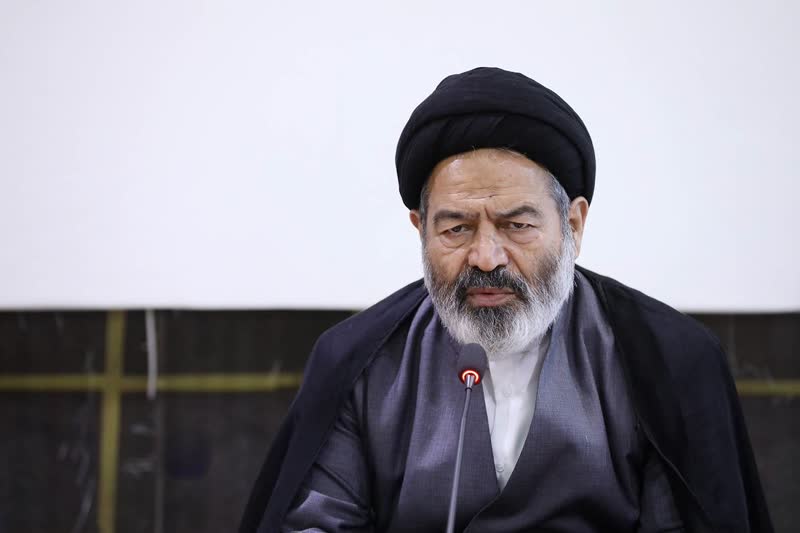
Hojjat al-Islam Navvab considered the occurrence of this enemy aggression ultimately to be in the interest of the Islamic Revolution and said: It is stated in the noble hadith that says "God supports this religion with a wicked man", Examples of which were the oppression and tragedies of the enemy on the day of Ashura and the formation of the Karbala uprising, which caused the uprising of Imam Hussein (AS) to keep Islam alive forever. "Our heartfelt hope is that the aggressions and oppressions of the Zionist regime will revive the path of Islam and defend the oppressed in the world."
He continued by referring to the Hajj plans for 1404 and said: "The host country announced a good plan to allocate the stoning of the Jamarat in the first hours of Eid al-Adha for Iranian pilgrims, which fortunately proved to be very useful for Iranian pilgrims. Also, maximum cooperation in creating facilities and conditions for the return of pilgrims from the northern border was also very desirable, for which we need to express our gratitude."
The head of Iranian pilgrims also expressed hope that the next Hajj would be operational with the same number of executive personnel as in previous years and that the pilgrims' return route from Jamarat to Iranian tents would be shortened.
The head of the Iranian pilgrims' association at the House of God considered it important to ensure the pilgrims' mental peace and said: "It is necessary for the caravan managers to explain the different conditions of the facilities in Iraq to the pilgrims so that the pilgrims' expectations upon entering Iraq are in line with the existing realities, which is effective in the pilgrims' satisfaction and mental peace."
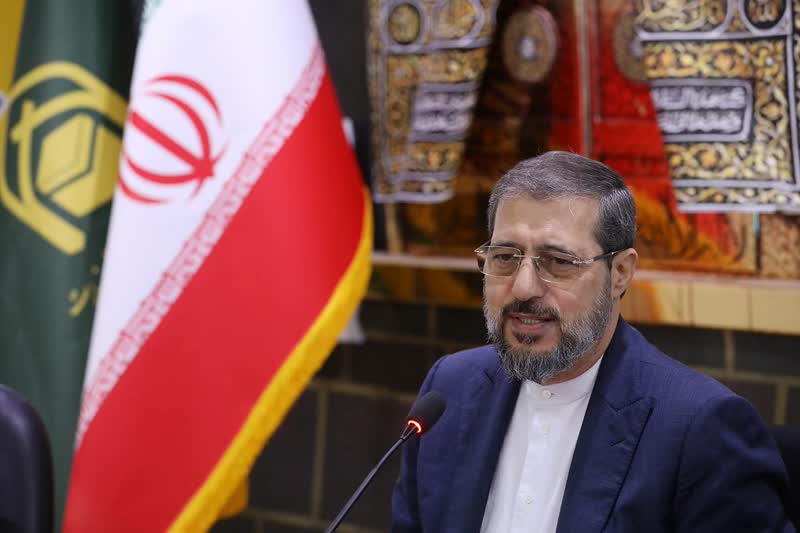
At the end of his speech, he expressed his appreciation and gratitude to all those serving in the administrative and cultural affairs of Hajj, as well as the Iranian Ambassador to Saudi Arabia and the Iranian Consul General in Jeddah, and all service providers in Iraq who manage and implement the return programs for Iranian pilgrims.
Appreciation of the Saudi ambassador to Iran for his cooperation and direct presence in one of the pilgrims' training programs was among other points raised by the Supreme Leader's representative in Hajj and pilgrimage affairs.
Continuing the meeting, the head of the Hajj and Pilgrimage Organization stated that with the grace of God Almighty and the jihadist efforts of the servants of Hajj affairs, this year's Hajj programs were held smoothly and said: The servants of the pilgrims created a very good atmosphere with empathy, purity, and sincerity, and God Almighty also bestowed His blessings.
He considered the significant number of pilgrims transferred to Iraq as one of the examples of divine grace and said: "On the first day of the start of this project, only 500 pilgrims were transferred to the Iraqi border, but with the good cooperation of the host country, the efforts of the servants, and divine grace, this number reached over 8,000 pilgrims in the shortest possible time. By the end of Dhul-Hijjah, all pilgrims present in Mecca will leave this city, and this number is more than previously planned."
Continuing his speech, the head of the Hajj and Pilgrimage Organization appreciated and thanked the representative of the Supreme Leader for his special support and care, saying: "The unwavering support of the representative of the Supreme Leader was a great support and encouragement in the ups and downs of executive affairs, which, along with his expert opinions, has led to an improvement in the level of service provided to pilgrims. This practice of his has spread to all levels of the Supreme Leader's delegation and the Hajj and Pilgrimage Organization, creating a very empathetic atmosphere."
In the continuation of the meeting, its officials presented a performance report and discussed various administrative and cultural issues.
Regarding consular services to Iranian pilgrims to the House of God, Hassan Zarnegar, the Iranian Consul General in Jeddah, said: "Burying bodies without the permission of the family has created problems, and the Iranian Consul General in Jeddah has sent three notes to the authorities, stating that it is necessary to transfer the bodies of deceased Iranian pilgrims to specific morgues and that burials will not take place until the family's permission is obtained."
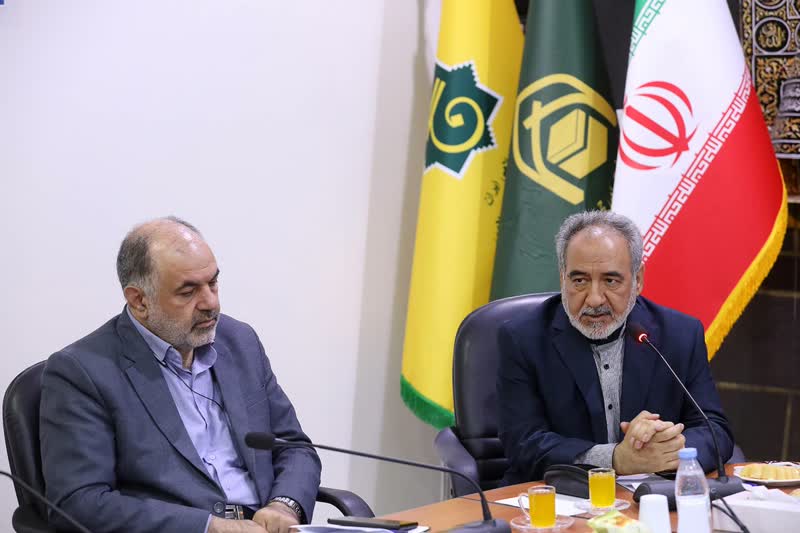
He spoke about his trip to the Ar Ar border and field supervision of services provided to pilgrims, saying: "With the efforts made, services provided to Iranian pilgrims at Arar airport and the Saudi-Iraqi border are being provided in the best possible way, and pilgrims do not have any special delays at these two points."
Mr. Zarnegar referred to the readiness of Arar Airport and said: "In recent days, 21 daily flights have been made to this airport, and the service has been in accordance with the required standards, indicating that this airport can be ready to provide services at other times as well."
Mr. Akbar Rezaei, the Hajj Operations Manager, continued by presenting a report on the status of services provided to pilgrims and said: As of Tir 2, 62,205 Iranian pilgrims have left Mecca for Medina and Iran, and currently, 24,495 Iranian pilgrims are present in Mecca, and all Iranian pilgrims will leave Mecca by Tir 6, 1404.
Pilgrims to Medina are currently present in this city, and the last caravans will bid farewell to this city on Tir 10.
He added: "The process of Iranian pilgrims leaving Saudi Arabia is very fast, and all pilgrims are being transported by plane to the Iraqi border and entering the country by buses. Meanwhile, some pilgrims from Khuzestan province requested to travel by land to the Iraqi border, and the necessary facilities were provided, and some of this group will be sent by plane."
The Deputy Minister of Hajj and Umrah of the Hajj Organization described the conditions for providing services to pilgrims inside Iraq as good, saying: "In the first few days, there were some transportation and coordination problems in serving those people, but fortunately, these problems have been resolved in the last 48 hours."
Following the meeting, Morteza Aghaei, Deputy Head of Shrines of the Hajj and Pilgrimage Organization, presented a report online regarding the provision of services to pilgrims inside Iraq, saying: "With the problem of transporting pilgrims by air, our colleagues in Iraq formed an extraordinary management team and within 24 hours provided the necessary arrangements for transportation, accommodation, and feeding the pilgrims."
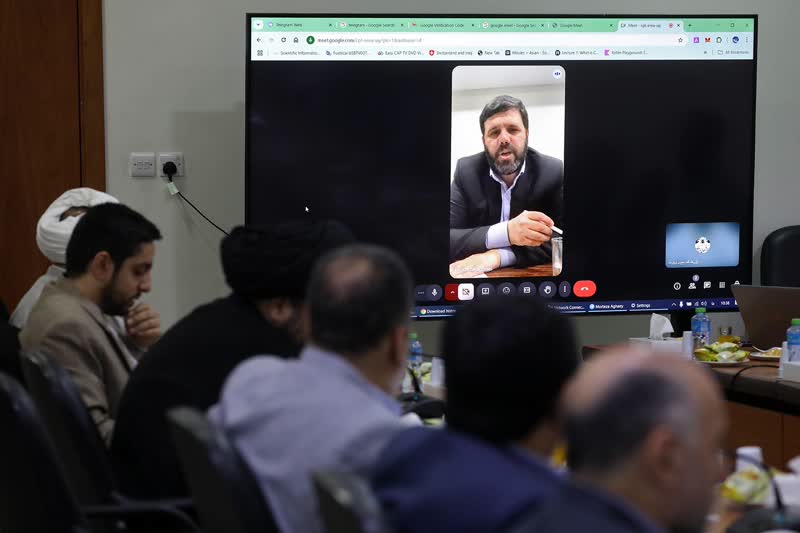
He added: "Currently, approximately 6,000 people are stationed in Karbala and 3,000 in Najaf, and we are prepared to provide services to up to 10,000 people simultaneously. Each pilgrim is present in one of the cities of Najaf or Karbala for 24 hours and then leaves for our country after the pilgrimage."
According to Mr. Aghaei, some conditions in the host country, such as the presence of military vehicles to maintain security, have slowed down the movement of pilgrims, and we are trying to resolve this problem.
He cited the delay in delivering pilgrims' luggage at the Mehran border, which was due to control by the "X-ray" device, as another problem, and said: "Fortunately, during the conversation that the head of the Hajj Organization had with provincial officials, this stage has accelerated."
Following the meeting, Hojjat al-Islam Rukn al-Dinini presented a report on cultural affairs, and said: "In this year's Hajj, we had various programs such as designing a smart accountability system, changing the service provision at Miqat al-Juhfa, and explaining the opinions of the authorities regarding the hajj, which reduced the problems related to this category in the land of Mina."
He considered the presence of fixed-term maids in hotels to be another measure of this year's Hajj, which has enabled all female pilgrims to benefit from the maids.
Hojjatoleslam Rukn al-Dinni then presented a statistical report on the cultural programs implemented during this year's Hajj.
Also, Dr. Ali Marashi, head of the Hajj and Pilgrimage Medical Board, in presenting a report on the performance of medical services for pilgrims, said: "Although the number of visits to receive medical services during this year's Hajj has increased, the service delivery operation was smooth and good."
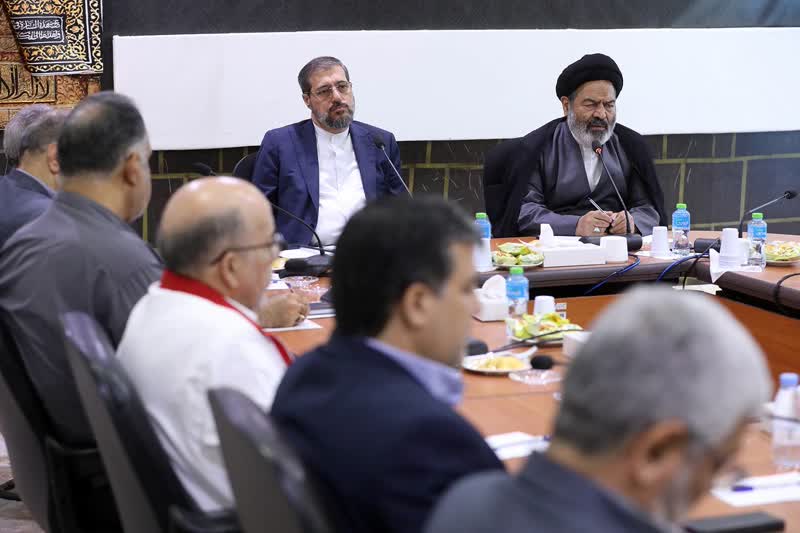
He said: "We currently have 14 patients hospitalized in hospitals in Mecca and one in Medina, and we are trying to provide the necessary conditions for sending these people through the Iraqi border. These people will be transported to our country with the full support of an Iranian medical team and ambulances."
At the end of this meeting, Mohammad Masoumi, head of the Islamic Republic of Iran Airlines office in Saudi Arabia, presented his services to pilgrims and said: "The operation to transport pilgrims to Saudi Arabia was much more favorable than in previous years, with flight delays being minimized and in some cases we had expedited flights."
He added: "The necessary conditions were also provided for the return of the pilgrims, but due to flight restrictions in Iranian skies, these plans are not currently being carried out by the Islamic Republic of Iran Airlines."











